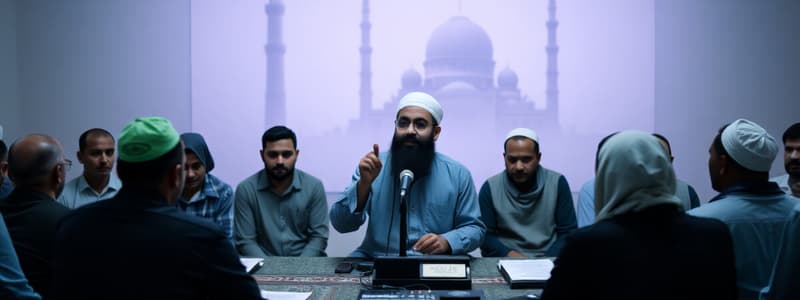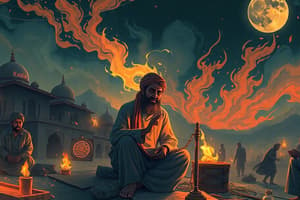Podcast
Questions and Answers
The Radio Mullah attributed the earthquake to reasons other than a 'true geological event'. What primary effect did this alternative explanation have on the community, particularly women?
The Radio Mullah attributed the earthquake to reasons other than a 'true geological event'. What primary effect did this alternative explanation have on the community, particularly women?
- It sparked widespread debate and skepticism about religious interpretations of natural events, leading to a decline in the mullah's authority and influence over time.
- It exacerbated existing fears and anxieties, particularly among uneducated women who relied on religious interpretations, making them more susceptible to the mullah's influence. (correct)
- It reassured the community by offering a scientifically sound reason for the natural disaster, thereby reducing fear and anxiety, especially among women.
- It unified the community in grief and resilience, as people sought solace in shared religious beliefs regardless of the mullah's specific interpretation.
When the Radio Mullah declared music 'haram' and dictated specific grooming standards for men, what was the most profound underlying message he was attempting to convey to his followers?
When the Radio Mullah declared music 'haram' and dictated specific grooming standards for men, what was the most profound underlying message he was attempting to convey to his followers?
- He intended to simplify religious life by removing distractions like music and ambiguous grooming styles, making it easier for people to focus on core Islamic duties.
- He sought to establish absolute control over personal and cultural expression, using religious justifications to enforce conformity and suppress dissenting voices within the community. (correct)
- He was responding to community concerns about the erosion of traditional values and the influence of Western culture, offering a return to what he presented as authentic Islamic practices.
- He aimed to purify Islamic practices by eliminating cultural elements deemed incompatible with strict religious doctrine, promoting a more devout form of worship.
The Radio Mullah's directives for women, such as staying at home in purdah and only venturing out in emergencies with a burqa and male relative, served what primary socio-political purpose within his broader agenda?
The Radio Mullah's directives for women, such as staying at home in purdah and only venturing out in emergencies with a burqa and male relative, served what primary socio-political purpose within his broader agenda?
- To reinforce a rigid social hierarchy and suppress female agency, thereby consolidating patriarchal power structures and limiting women's participation in public life. (correct)
- To distinguish his followers from more secular elements of society, creating a distinct identity based on strict adherence to gender-segregated norms as a marker of piety.
- To ensure the safety and protection of women in a society facing instability and potential threats, adhering to traditional Islamic customs of female guardianship.
- To streamline domestic roles and responsibilities, creating a more stable and orderly family unit within the community based on traditional gender divisions.
Initially, the Radio Mullah's sermons were perceived positively, even by the author's mother. Which factor most significantly contributed to this initial favorable reception, despite the extremist undertones?
Initially, the Radio Mullah's sermons were perceived positively, even by the author's mother. Which factor most significantly contributed to this initial favorable reception, despite the extremist undertones?
Maulana Fazlullah, the Radio Mullah, was identified as a leader of TNSM. How did his affiliation with TNSM strategically contribute to his rise in influence and authority?
Maulana Fazlullah, the Radio Mullah, was identified as a leader of TNSM. How did his affiliation with TNSM strategically contribute to his rise in influence and authority?
The text mentions that followers of the Radio Mullah 'had helped many after the earthquake but were taking advantage of the trauma to instill fear'. What critical dynamic does this duality reveal about their strategy?
The text mentions that followers of the Radio Mullah 'had helped many after the earthquake but were taking advantage of the trauma to instill fear'. What critical dynamic does this duality reveal about their strategy?
When the Radio Mullah shifted from general religious pronouncements to personally attacking individuals campaigning for peace, what significant change in tactics did this represent, and what was its likely intended outcome?
When the Radio Mullah shifted from general religious pronouncements to personally attacking individuals campaigning for peace, what significant change in tactics did this represent, and what was its likely intended outcome?
The claim that the Radio Mullah and his men 'could see through walls' is best interpreted as what kind of tactic within their broader strategy of control?
The claim that the Radio Mullah and his men 'could see through walls' is best interpreted as what kind of tactic within their broader strategy of control?
The initial positive perception of the Radio Mullah, followed by his increasingly extremist pronouncements, illustrates what broader societal vulnerability that extremist movements often exploit?
The initial positive perception of the Radio Mullah, followed by his increasingly extremist pronouncements, illustrates what broader societal vulnerability that extremist movements often exploit?
The text mentions 'everyone was frustrated with the corrupt Pakistani justice system'. How did this pre-existing condition of public distrust in the legal system contribute to the Radio Mullah's growing influence?
The text mentions 'everyone was frustrated with the corrupt Pakistani justice system'. How did this pre-existing condition of public distrust in the legal system contribute to the Radio Mullah's growing influence?
Flashcards
Radio Mullah
Radio Mullah
A term referring to a cleric using radio broadcasts to influence public opinion.
Maulana Fazlullah
Maulana Fazlullah
Leader of TNSM and the voice behind the Radio Mullah.
TNSM
TNSM
Tehreek-e-Nifaz-e-Shariat-e-Mohammadi, a movement advocating for strict Islamic law in Pakistan.
Purdah
Purdah
Signup and view all the flashcards
Haram
Haram
Signup and view all the flashcards
Burqa
Burqa
Signup and view all the flashcards
Charisma of the Mullah
Charisma of the Mullah
Signup and view all the flashcards
Public Shaming
Public Shaming
Signup and view all the flashcards
Islamic Law
Islamic Law
Signup and view all the flashcards
Earthquake Aftermath
Earthquake Aftermath
Signup and view all the flashcards
Study Notes
Radio Mullah's Messages
- The Radio Mullah's messages aimed to discourage girls from attending school.
- The speaker's father disapproved of the Mullah from the start.
- The Mullah was seen as spreading misinformation and causing trouble.
- The father investigated the Mullah's identity and found he was a high school dropout.
- He lacked religious credentials and was spreading ignorance.
Impact of the Earthquake
- The earthquake caused widespread grief and suffering.
- The radio mullah's sermons were problematic in the face of devastation.
- People were influenced by the radio mullah, especially women, and attracted to his charisma.
- His teachings romanticized and impacted people's understanding of Islamic law, and the speaker's perception of the speaker's family.
- The Radio Mullah took advantage of the trauma of the earthquake to control people.
Mullah's Teachings and Actions
- The Mullah strictly enforced religious rules, particularly about music (haram), women's attire and behaviour.
- Men were encouraged to grow long hair and beards.
- Women were required to stay at home, wear burqas, and only venture out with a male relative.
- The Mullah took personal attacks against individuals openly opposing him.
- His followers helped numerous people, but he preyed on their vulnerabilities after the earthquake.
- The speaker's family and wider community were affected by the broadcasts, and public discourse felt influenced by unseen voices.
Personal Observations and Experiences
- The speaker's family was initially supportive of the Radio Mullah about daily prayer.
- Over time, the community's perception of him changed.
- The speaker's understanding of the Radio Mullah evolved while growing older.
- It became harder for the speaker to observe conversations unnoticed as she got older.
Studying That Suits You
Use AI to generate personalized quizzes and flashcards to suit your learning preferences.
Description
The messages of the Radio Mullah discouraged girls' education and spread misinformation, exploiting the trauma after the earthquake. His teachings romanticized Islamic law, impacting community perceptions. Despite lacking religious credentials, he gained influence, particularly over women.




